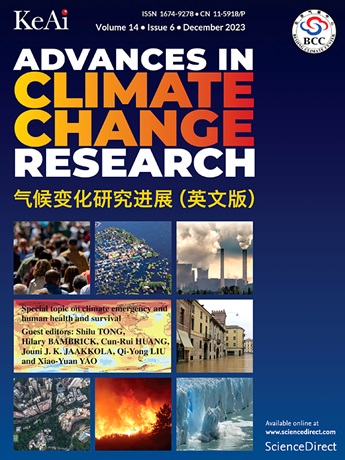Bidirectional allocation method of provincial carbon emission allowances under China's 2030 carbon peak target: From equity and efficiency perspective
IF 5.2
1区 地球科学
Q1 ENVIRONMENTAL SCIENCES
引用次数: 0
Abstract
To address the shortcomings of existing research on provincial carbon emission allowance (CEA) allocation regarding connecting the current situation with future trends, balancing provincial development demands with responsibilities, as well as reconciling equity and efficiency, this study proposed a bidirectional CEA allocation method to guide China's 2030 carbon peak goal. Drawing on province-specific characteristics and multiple guiding principles, we designed 961 allocation schemes. An integrated evaluation system combining equity (via the extended Gini coefficient) and efficiency (via the Malmquist index) yielded 18 Pareto-optimal solutions. These schemes achieve a trade-off between equity (Gini coefficient 0.29–0.33) and efficiency (Malmquist index 1.010–1.015). The optimal schemes account for provincial heterogeneity: advanced regions such as Beijing, Shanghai, and Guangdong would reduce emissions below their 2020 levels under ten of the eighteen schemes, whereas regions such as Tianjin, Shanxi, and Shaanxi would still have room for emission growth across all schemes. By offering a suite of trade-off solutions, our approach equips policymakers with the flexibility to prioritize equity or efficiency according to regional needs. Additionally, tailored policy recommendations are outlined for advancing carbon dual-control mechanisms and crafting support measures reflecting provincial characteristics.
中国2030年碳峰值目标下省级碳排放限额的双向分配方法:基于公平与效率的视角
针对现有省级碳排放配额分配研究在联系现状与未来趋势、平衡省级发展需求与责任、协调公平与效率等方面存在的不足,本研究提出了双向碳排放配额分配方法,以指导中国2030年碳峰值目标的实现。根据各省特点和多重指导原则,我们设计了961个分配方案。一个结合公平(通过扩展基尼系数)和效率(通过马尔姆奎斯特指数)的综合评估系统产生了18个帕累托最优解。这些方案实现了公平(基尼系数0.29-0.33)和效率(Malmquist指数1.010-1.015)之间的权衡。最优方案考虑了各省的异质性:北京、上海和广东等发达地区在18个方案中的10个方案下的排放量将低于2020年的水平,而天津、山西和陕西等地区在所有方案下仍有排放增长的空间。通过提供一套权衡解决方案,我们的方法使政策制定者能够灵活地根据地区需要优先考虑公平或效率。此外,为推进碳双重控制机制和制定反映省级特色的支持措施,提出了有针对性的政策建议。
本文章由计算机程序翻译,如有差异,请以英文原文为准。
求助全文
约1分钟内获得全文
求助全文
来源期刊

Advances in Climate Change Research
Earth and Planetary Sciences-Atmospheric Science
CiteScore
9.80
自引率
4.10%
发文量
424
审稿时长
107 days
期刊介绍:
Advances in Climate Change Research publishes scientific research and analyses on climate change and the interactions of climate change with society. This journal encompasses basic science and economic, social, and policy research, including studies on mitigation and adaptation to climate change.
Advances in Climate Change Research attempts to promote research in climate change and provide an impetus for the application of research achievements in numerous aspects, such as socioeconomic sustainable development, responses to the adaptation and mitigation of climate change, diplomatic negotiations of climate and environment policies, and the protection and exploitation of natural resources.
 求助内容:
求助内容: 应助结果提醒方式:
应助结果提醒方式:


